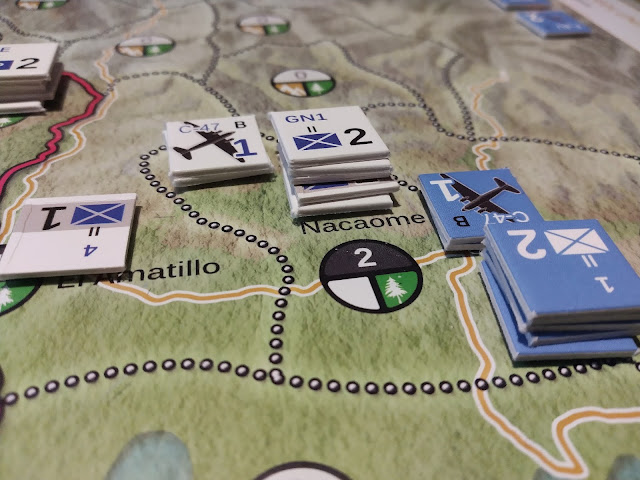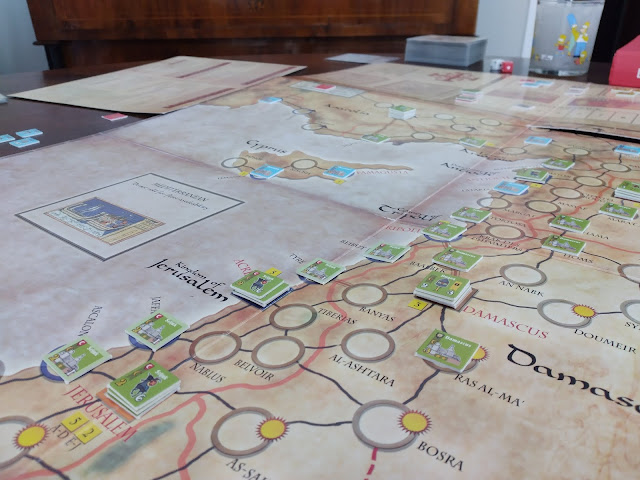Bomber Command. The battle of Magdeburg
English: Alex Isabelle
German: Laura Beltrami
The Battle of Magdeburg, a complex and poorly organized night operation with which the RAF proposed to strike the capital of Saxony, lasted a total of eight hours. Eight hours in the "narrated" life of the game, where each turn corresponds to half an hour of simulated time; about eight hours (but I think even more) even in the real world, where we interspersed the game several times, making it last a total of three nights.
On the one hand, some six hundred British bombers, divided into four groups, arrived from across the Channel in the form of a terrifying 250-mile long single line (think about it, a 250-mile line of bombers). On the other hand, the forces of the Nachtjagd, that is to say the branch of the German air force specialized in night fighters.
As mentioned, the raid was badly organized. Underestimating the German ability to react, the Englishman opted for a centralized breakthrough in the direction of Helgoland Bay. Here, two of the groups of bombers, in charge of the "gardening" operations, that is to say the deposit of naval mines in two crucial points of the marine territory of the Reichs, would have provided to finalize their work, just while further south from the main group a small group of "Mosquitoes" would break up and carry out an attack on Braunschweig. This was only to distract attention from the real theater of the games: Magdeburg, of which the bombers were targeting the historic center, and possibly the adjacent river port, to reduce German morale and their logistic means at the same time.
The centralized breakthrough would have been fine, if it wasn't that the detour to the bay of Heligoland had lengthened the route considerably, exposing the main raid to a long series of attacks, painstakingly repelled. At the same time, having only one entry point led the German to concentrate all its forces towards the north, which were therefore able to concentrate their attacks on the main bomber group. These attacks partially weakened, but above all disorganized, the line of British bombers, which therefore could only obtain partial success in the bombing phase. Since the bombers were unable, partly due to the unsuitable environmental conditions, to fully concentrate their attack, the historic center and the residential districts were in fact largely saved from the bombing; however, the river port of the city was completely razed to the ground, which would at least make this attack a partial strategic success.
The German defense was tenacious, perhaps too much. There have been many wasted opportunities, while others were taken brilliantly. Especially on the English return trip, organized if possible even worse than the outbound one (both bombers dedicated to "gardening" flew 100 miles under constant flak attack, as well as ground-guided fighters), Germans managed to insert some of their fighters into the stream of bombers, scoring an excellent series of kills. But they too received many losses.
It would have been a draw if one of the "gruppen" of the Nachtjagd, as a result of a terrible oversight of the central command, had not found himself abandoned without fuel in the middle of English territory, after a long pursuit of the bombers responsible for the attack on Magdeburg. In the desperate return that followed, eight planes were left behind, forced to make an emergency landing on the English moors. We like to think that it was not really an oversight, but a deliberate desertion and self-surrender to the enemy of this group of soldiers insensitive to the sufferings of mother Germany.
This enormous loss of military means has definitively made this a British strategic victory. The mining of the Heligoland Bay was enormously fruitful and precise, and has revived the partial failure of the bombing of Magdeburg. The enormous price in terms of human lives would have relegated this battle to a draw, but the equally high price paid by the Germans finally made it an English victory, albeit a painful one.
Do you want to read other stories? Click here for the full list.













Comments
Post a Comment